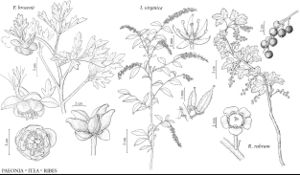Iteaceae
Shrubs [subshrubs, trees, vines], evergreen to semievergreen [deciduous]. Leaves alternate, simple; stipules present; petiole present; blade margins unlobed, glandular-serrate [entire]. Inflorescences terminal or axillary racemes [panicles]. Flowers bisexual; perianth and androecium nearly hypogenous [3/4 epigynous]; hypanthium adnate to ovary at base, free distally; sepals 5, connate proximally; petals 5, distinct; nectary disc present; stamens 5, antisepalous, inserted at nectary margin, free, distinct; anthers introrsely dehiscent by longitudinal slits; pistils 1, 2-carpellate; ovary nearly superior [to 3/4 inferior], 2-locular; placentation axile; ovules anatropous, bitegmic, crassinucellate; styles 2, distinct or connate apically; stigmas 2, terminal, capitate. Fruits capsular, dehiscence septicidal. Seeds 20–30, dark-brown or yellowish-brown, narrowly fusiform or ovoid; endosperm sparse, fleshy.
Distribution
c, e United States, e Asia, Africa
Discussion
Genus 1, species 29 (1 in the flora).
Iteaceae, which has been included in Grossulariaceae (A. Cronquist 1981) or Escalloniaceae (R. F. Thorne 1992b), has a disjunct distribution, with Itea virginica in southeastern North America and other species in southeastern Africa and southeastern Asia. Molecular data place it sister to the Mexican genus Pterostemon S. Schauer within the core Saxifragales (M. Fishbein et al. 2001).
Selected References
None.
